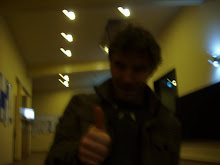At ten months, Thomas Pynchon's Against the Day just became the longest read of my life. As I've been saying all this year, I started the book on Boxing Day and have been fighting it ever since. Appropriately enough, the t.k.o. came this morning, the Day of the Dead.
It was a bumpy ride, with two extended hiatuses and several trips for the book itself, which has now been to Powell River, Toronto and Black Rock City. Along the way I discovered this fantastic concept album from Montreal's Land of Kush, first as a download and then, last week, a beautiful 180-gram vinyl pressing, fortuitously timed for the home stretch run I made over the Halloween weekend.
I'll take the time to copy out my personal favorite passage below, as I feel that this one page comes the closest to summing up the center of gravity of one of the strangest, wildest, most confusing storylines/themes I've ever attempted to pursue (or was it pursuing me?).
"I want to know light," Roswell was confessing, "I want to reach inside light and find its heart, touch its soul, take some in my hands whatever it turns out to be, and bring it back, like the Gold Rush only more at stake, maybe, 'cause it's easier to go crazy from, there's danger in every direction, deadlier than snakes or fever or claim jumpers--"
"And what steps are you taking," Merle inquired, "to make sure you don't end up wandering around the badlands of our fair republic raving about lost mines and so forth?"
"I'm heading for California," replied Roswell.
"That ought to help some," said Merle.
"I'm serious. It's where the future of light is, in particular the moving pictures. The public loves those movies, can't get enough of 'em, maybe that's another disease of the mind, but as long as nobody finds a cure for it, the Sheriff will have to keep settling for traildust in my case."
"There sure is projectionist work everyplace you look," Merle said, "but the machinery itself, it's dangerous, and somehow, I'm not sure why, but - more complicated than it needs to be."
"Yes, it continues to puzzle me," Roswell agreed, "this irrational worship of the Geneva movement, and the whole idea of a movie projector being built like a clock - as if there could be no other way. Watches and clocks are fine, don't mistake my meaning, but they are a sort of acknowledgement of failure, they're there to glorify and celebrate one particular sort of time, the tickwise passage of time in one direction only and no going back. Only kind of movies we'd ever get to see on a machine like that'd be clock movies, elapsing from the beginning of the reel to the end, one frame at a time.
"One problem the early watchmakers had was that the weight of the moving parts would affect the way the watch ran. Time was vulnerable to the force of gravity. So Breguet came up with the tourbillon, which isolated the balance wheel and escapement off on a little platform of their own, geared to the third wheel, rotating about once a minute, assuming in the course of the day most positions in 3-D space relative to the gravity of the Earth, so the errors would cancel out and make time impervious to gravity. But now suppose you wanted to turn that around."
"Make gravity impervious to time? Why"
Roswell shrugged. "It's that one-way business again. They're both forces that act in one direction only. Gravity pulls along the third dimension, up to down, time pulls along the fourth, birth to death."
"Rotate something through space-time so it assumes all positions relative to the one-way vector 'time.'"
"There you go."
"Wonder what you'd get."
--A.T.D., p.456-457
edited to add, this review is probably the most succinct I've come across.
Choice quote:
"Having finally finished, I felt like an exhausted swimmer crawling onto the far shore of a body of water that turned out to be even wider than it looked."
Subscribe to:
Post Comments (Atom)

No comments:
Post a Comment